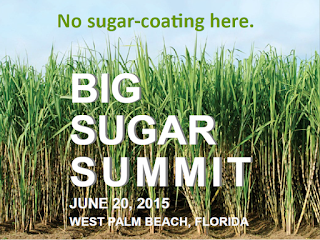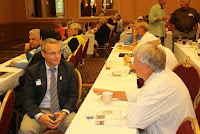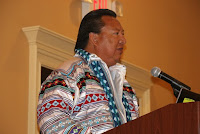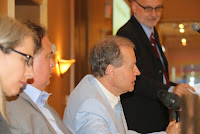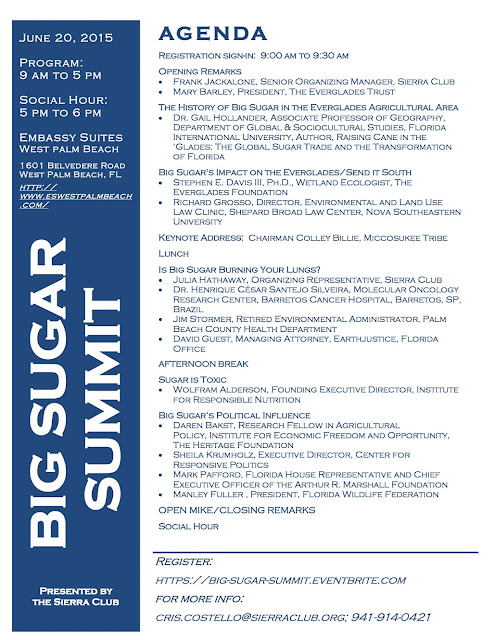The
intention was to pull the curtain back on the sugar
industry. We wanted to dig as deep into the muck as we could, in one day,
to uncover just how profoundly Big Sugar affects us all.
Why?
Because after the
November 2014 elections, the South Florida Water Management District
Governing Board’s refusal to buck Big Sugar, and the 2015 Florida
Legislative sessions, it
became crystal clear that Big Sugar rules Florida (for now). We need to take a different approach to
tackling the stranglehold Big Sugar has on all of us, and the way to
begin is to learn as much as possible about the industry's impact on Florida and its citizens.
 Two hundred and fifty seven citizens packed the West Palm Beach Embassy
Suites ballroom for over eight hours on June 20. They not only heard fourteen
speakers from a wide variety of disciplines and from each end of the political
spectrum, but they also joined the conversation.
Two hundred and fifty seven citizens packed the West Palm Beach Embassy
Suites ballroom for over eight hours on June 20. They not only heard fourteen
speakers from a wide variety of disciplines and from each end of the political
spectrum, but they also joined the conversation.
The dialogue started with the Founder of The Everglades Trust, Mary Barley's opening remarks recounting her personal,
decades-long battle to rein in Big Sugar for the sake of Everglades
restoration.
 Dr.
Gail Hollander, Associate Professor of Geography, Department of Global &
Sociocultural Studies, Florida International University, Author of Raising
Cane in the ‘Glades: The Global Sugar Trade and the Transformation of Florida took
attendees on a ride back through history to discover how and
why Big Sugar landed in South Florida and more specifically in the Everglades
Agricultural Area.
Dr.
Gail Hollander, Associate Professor of Geography, Department of Global &
Sociocultural Studies, Florida International University, Author of Raising
Cane in the ‘Glades: The Global Sugar Trade and the Transformation of Florida took
attendees on a ride back through history to discover how and
why Big Sugar landed in South Florida and more specifically in the Everglades
Agricultural Area.
Stephen
E. Davis III, Ph.D., Wetland Ecologist with The Everglades Foundation
detailed the past, present, and future of Everglades restoration, the need to send water south from Lake Okeechobee, and the
desperate ecological situation in the St. Lucie and Caloosahatchee estuaries.
 Richard
Grosso, Director, Environmental and Land Use Law Clinic, Broad Law Center, Nova
Southeastern University, gave the crowd a lesson in how Sugar Hill City,
a development proposal pursued by U.S. Sugar Corp. and the Hilliard Brothers, is not only a real
threat to public safety and the progress of Everglades restoration but also a
supreme example of just how powerful Big Sugar is.
Richard
Grosso, Director, Environmental and Land Use Law Clinic, Broad Law Center, Nova
Southeastern University, gave the crowd a lesson in how Sugar Hill City,
a development proposal pursued by U.S. Sugar Corp. and the Hilliard Brothers, is not only a real
threat to public safety and the progress of Everglades restoration but also a
supreme example of just how powerful Big Sugar is.
The
keynote address by Chairman Colley Billie of the Miccosukee Tribe of Indians
was the highlight of the day. Chairman Billie's deep conviction that water
quality in the Everglades must be the top priority, and that we must work
together to achieve a high standard of water quality, was impressed upon
everyone in the room.
 The
subsequent panel, titled “Is Big Sugar Burning Your Lungs,” included Julia
Hathaway, Organizing Representative, Sierra Club; Dr. Henrique César Santejo
Silveira, Molecular Oncology Research Center, Barretos Cancer Hospital,
Barretos, SP, Brazil; Jim Stormer, Retired Environmental Administrator,Palm Beach County Health Department; and David Guest, Managing Attorney,
Earthjustice, Florida Office.
The
subsequent panel, titled “Is Big Sugar Burning Your Lungs,” included Julia
Hathaway, Organizing Representative, Sierra Club; Dr. Henrique César Santejo
Silveira, Molecular Oncology Research Center, Barretos Cancer Hospital,
Barretos, SP, Brazil; Jim Stormer, Retired Environmental Administrator,Palm Beach County Health Department; and David Guest, Managing Attorney,
Earthjustice, Florida Office.
All
spoke on the subject of the damaging, outdated
practice of pre-harvest burning of sugarcane fields in South Florida.
How sugar growers profit at the expense of public health in the EAA
was a special point of interest for many attendees. See here for a more expansive description
of the panel's offerings.
 Next on
the agenda was Wolfram Alderson, Founding Executive Director, Institute for Responsible Nutrition, who had the most "digestible" of all the presentations. Alderson offered the facts on sugar consumption, its role in human health (or lack thereof), its global impact, and the ubiquitous presence of added sugar in the U.S diet.
Next on
the agenda was Wolfram Alderson, Founding Executive Director, Institute for Responsible Nutrition, who had the most "digestible" of all the presentations. Alderson offered the facts on sugar consumption, its role in human health (or lack thereof), its global impact, and the ubiquitous presence of added sugar in the U.S diet.
Sheila Krumholz, Executive Director of the Center for Responsive Politics, brought all the truly disturbing news of just how many Big Sugar dollars make their way into political decisions and election results at the federal level. After all that, she inspired the crowd with her optimism that voters and well-informed citizens can still and must fight back.
Manley
Fuller, President of Florida Wildlife Federation, who has seen it all at
the state level for decades of the Everglades restoration struggle, brought the
formal program to a close.
Last, but certainly not least, was the open microphone at the end of the program where
attendees had the opportunity to share ideas, pose questions, and propose next
steps.
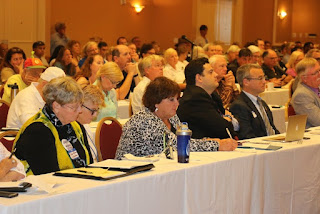 Frank Jackalone, Florida Staff Director of the Sierra Club, summed up by noting that the future of our entire state, and not just South Florida, depends on our winning this fight to cut Big Sugar down to size.
Frank Jackalone, Florida Staff Director of the Sierra Club, summed up by noting that the future of our entire state, and not just South Florida, depends on our winning this fight to cut Big Sugar down to size.
For more Big Sugar Summit follow-up, visit and re-visit to this link where photos, presentations, videos and opportunities for further discussion will be posted as they become available.
